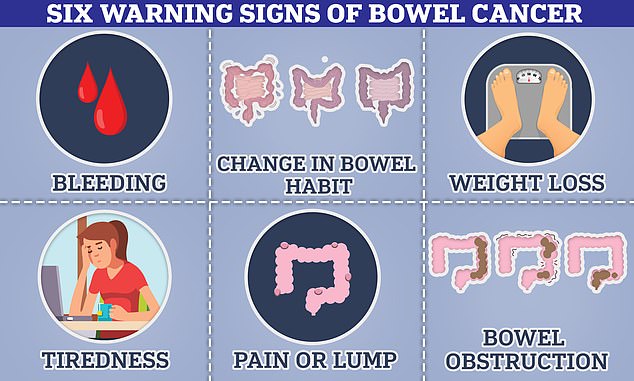You could be taking a regular supplement in the WRONG way, doctor warns – as study shows risk of colon cancer
Nearly half of Brits admit to taking a supplement at least once a month in the pursuit of optimal health.
But one of Britain’s most popular pills could be putting users at risk of potentially serious bowel problems, an expert has warned.
Taking certain types of iron supplements more than once a day can cause diarrhea, constipation and inflammation in the intestines – which has been linked to conditions like Crohn’s disease and ulcerative colitis.
It could also affect the way the intestines absorb other minerals, British GP Dr Ahmed Abd Elbary said in a study. TikTok video seen almost 550,000 times.
Research has also long suggested that the supplement – if taken in excess – could increase the risk of bowel cancer, which kills almost 17,000 Britons every year – and that this rate rises under the age of fifty.
The pills, which are taken orally, can be prescribed by doctors for iron deficiency and purchased without a prescription under the medical names ferrous fumerate, ferrous sulfate or ferrous gluconate.
Dr. Elbary said: ‘This is one of the most common medicines we prescribe and yet everyone has been prescribing it incorrectly – even though the guidelines changed over two years ago.
‘This should be taken once a day, not twice a day and not three times a day.
‘Sometimes it’s just as good to take one every other day.
‘The reason for this is that when you take iron orally, it increases a protein called hepcidin, which blocks a transporter responsible for transporting iron from the intestines to the blood.
‘This will be increased for 24 hours. Once you take iron, more iron will build up in your intestines.
‘This can cause intestinal inflammation that can cause diarrhea, constipation and stomach pain.’
He added: ‘Not only that, if you do this long enough and take iron more than once a day, it can affect the gut microbiome, which can lead to inadequate absorption of other vitamins and minerals.
‘There are very few reasons to take iron more than once a day, so if so, ask your doctor why.
“Chances are they’re probably just not aware of the most current guidelines.”
According to NHS guidelines, men should consume around 8.7mg of iron per day, while women aged 19 to 49 recommend 14.8mg.
For women over 50, the health care system recommends 8.7 mg, as they are likely to no longer have periods.
The mineral is essential for making red blood cells, which transport oxygen and blood throughout the body.
This means that adequate iron is crucial for a range of body functions, including general energy and focus, gastrointestinal processes and a healthy immune system.
Iron tablets sold over the counter in pharmacies for as little as £250 often contain around 14 mg per tablet. Pictured, stock image of iron tablets

Bowel cancer can cause you to have blood in your poop, a change in bowel habits, or a lump in your bowel that can cause blockages. Some people also suffer from weight loss as a result of these symptoms
Iron tablets sold over the counter in pharmacies for as little as £2.50 often contain around 14 mg per tablet.
But the NHS also suggests that Brits should be able to ‘get all the iron they need from their daily diet’.
Red meats such as beef, lamb and pork are touted by dietitians as rich sources of iron, while legumes and dark green vegetables, including lentils, spinach and kale, are good plant-based sources of iron.
Research has long suggested that people can get too much iron are at higher risk of developing complications such as cirrhosis, diabetes or heart failure.
Too much iron can also lead to erectile dysfunction and a loss of sex drive in men, and can affect a woman’s menstrual cycle.
Research has also shown that high iron levels can increase the risk of colon cancer by causing oxidative damage to cells.
There are around 44,000 cases of bowel cancer in Britain and 142,000 in the US each year, making it the fourth most common cancer in both countries.
But cases among young people are increasing, an alarming trend that experts have linked to modern diets, chemical exposures and lifestyles.
Symptoms of colon cancer include changes in bowel habits, such as persistent and new diarrhea or constipation, the need or desire to poop more or less often, and blood in the stool.
Stomach pain, a lump in the stomach, bloating, unexpected weight loss and fatigue are some other common symptoms.
Anyone experiencing these symptoms should contact their GP for advice.
The disease, the third most common cancer in Britain, is the same type that killed Dame Deborah James at age 40 in 2022.
Although the vast majority of diagnoses affect people over 50, rates have declined or remained stable in older age groups, while diagnoses in younger adults have increased by 50 percent over the past three decades.
Cancer Research UK estimates that more than half (54 percent) of bowel cancer cases in Britain are preventable.
Doctors have suggested that obesity, overuse of antibiotics, cell phone radiation and even invisible plastic particles in drinking water are potential triggers.
